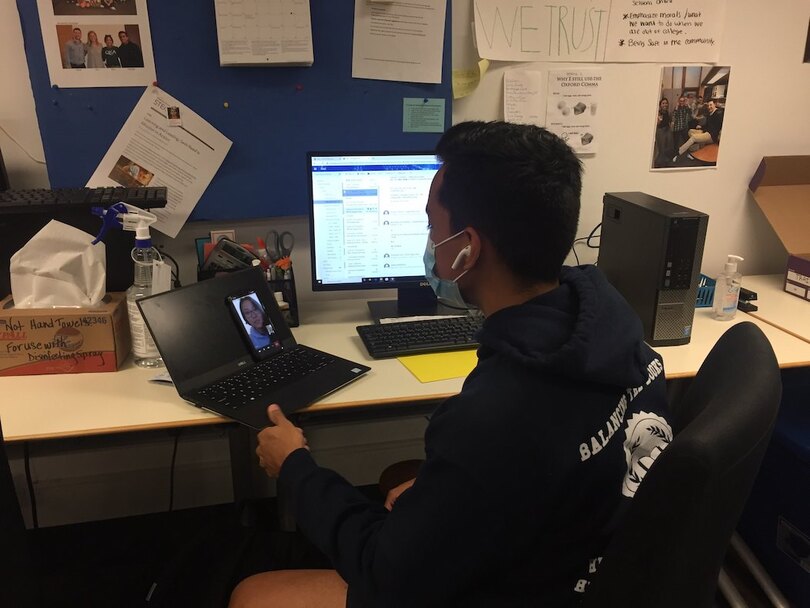Students seek community service alternatives as programs move online

Some community service programs have seen increased involvement from students despite having to move content online. Courtesy of Carla Ramirez
The Daily Orange is a nonprofit newsroom that receives no funding from Syracuse University. Consider donating today to support our mission.
Before the coronavirus pandemic, Erin Thalacker would travel to schools in Syracuse to teach financial literacy.
Now, the SU student-led tutoring program Thalacker is a part of, Balancing the Books, has paused in-person lessons to prevent the spread of COVID-19. The transition online has made it harder for Thalacker to make connections with the students, she said.
“It’s frustrating because I feel like we can’t really reach this community in the way we want to and have the interactions between Syracuse students and local Syracuse city students, the way that we would like,” said Thalacker, a senior finance, marketing, and supply chain management major and the program coordinator for Balancing the Books.
Several community service programs at SU have transitioned online this semester. Although they can’t interact with Syracuse residents in person, student volunteers have found alternatives in an effort to remain engaged with the community without leaving University Hill.
Since they cannot visit schools in person, Balancing the Books, a partnership between the Martin J. Whitman School of Management and the Mary Ann Shaw Center for Public Community Service –– now posts material online for local students to access.
Other SU volunteer programs have also opted to try and reach the Syracuse community virtually.
During a regular semester, SU Literacy Corps would hire 80 to 100 SU students to tutor local children at 40 different sites within the Syracuse City School District, said Carla Ramírez, the program coordinator at the Shaw Center. Now, the program has shifted to remote tutoring and only employs 20 students in total.
Ramírez said she has reached out to the North Side Learning Center and different schools and colleges within SU to find projects and tutoring opportunities for students in the program.
“We’re also focusing on the positives of the situation because it has let us explore new possibilities,” she said.
Students involved in the Shaw Center community service programs are also looking for ways to host socially distanced events on campus, said Pamela Heintz, associate vice president for engagement and director for the Shaw Center.
The Shaw Center doesn’t want to create more work for faculty in the local school districts, who are already dealing with a difficult semester due to the pandemic, Heintz said. Also, some students in city schools may not have the resources to engage with SU students virtually, she said.
“We have to be really careful to make sure we’re being equitable and not burdening the community,” she said.
Volunteers with Engineering Ambassadors, another SU community service program active in city schools, have made instructional videos for the students as an alternative to their typical in-person lessons, said Eric Lee, a senior computer science major and site coordinator for the program.
Despite not being able to recruit new SU student volunteers in person, Lee said he has seen a 20% to 30% increase in attendance rate at meetings and training sessions. SU students, he said, are more willing to get involved this semester now that the program’s meetings are virtual.
“I feel like now that COVID happened, more people want to volunteer and help out,” he said.
Other community service programs have also seen increased involvement from students despite having to move content online.
Syeisha Byrd, the director of the Office of Engagement Programs at Hendricks Chapel, said more students have contacted her this semester about volunteer opportunities than in past years. Organizations, such as Greek life, that can’t hold their usual community service events have collaborated with Byrd on alternative initiatives.
“Folks still want to help,” Byrd said. “They still want to give back. They still want to learn from the community. It’s just about finding creative ways to continue to do that.”
Byrd said Greek councils including the Interfraternity Council and National Association for Latino Fraternities are doing a food drive for on-campus and local food pantries.
SU’s effort to continue community service efforts during the pandemic comes after the university announced it would allocate $600,000 for volunteer programming last semester in response to the #NotAgainSU demands.
Byrd said she has seen “steady” attendance for programs she oversees that have moved online, such as Young Scholars, a program where SU students tutor children from the Boys and Girls Club of Syracuse.
“I don’t want the momentum to stop. Life is so changing right now. I just think for our mental health, giving back and continuing to serve is a positive,” she said.





